The Essgee Pinafore (1997)
| Sir Joseph Porter | Drew Forsythe |
| Captain Corcoran | David Gould |
| Ralph Rackstraw | Simon Gallaher |
| Dick Deadeye | Jon English |
| Bill Bobstay | Jason Barry-Smith |
| Josephine | Helen Donaldson |
| Little Buttercup | Amanda Muggleton (Australia) Rima Te Wiata (New Zealand) |
| Sir Joseph's Sister, Cousin, & Aunt (The Absolutely Fabulettes) | Marissa Craig Andrea Gallaher Melissa Langton |
Orchestrator & Conductor: Kevin Hocking
Producer: Simon Gallaher and
Essgee Entertainment of
Queensland, Australia
Review by Frank Shann
This is no ordinary production of G&S. It fairly zings along, bubbling with joie de vivre, good humour and spice. There is good acting, great singing and great dancing. It's definitely from the same G&S Heaven as the previous offerings from Essgee Productions — Pirates and The Mikado.. Both the live productions and the videos have been enormously popular in Australia and New Zealand, and I understand that the Company plans to perform on Broadway late in 1998. [The Company's Broadway debut was still in the planning stage as of late 2001. —ed.]
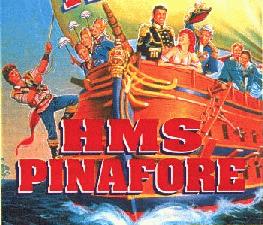 Essgee Pinafore Logo |
However, you won't like this version of Pinafore if you're a strict G&S traditionalist. Considerable liberties are taken with the script, two songs are left out ("The Nightingale" in Act I, and most of "Farewell, My Own" in Act II) and several songs adapted from other G&S opreas are added (King Gama's Song from Princess Ida, the Roulette Song from The Grand Duke, "The World is But a Broken Toy" from Princess Ida, and "If you go in" from Iolanthe). The start of Act II has been radically changed: it begins with Sir Joseph teaching the Captain how to dance a hornpipe, and that is followed by "The Hours Creep On Apace" (beautifully sung by Helen Donaldson), the Roulette Song, and "Fair Moon" (changed to a duet between the Captain and Buttercup).
Even worse (for the purists) is that the music is played on three Moog synthesizers, with not a violin in sight. The traditional battle continues between the conductor (Kevin Hocking) and Jon English:
Deadeye. You all hate me, don't you?
Hocking (from the orchestra pit). We do!
Sir Joseph. Have you such a thing as a dungeon on board?
Deadeye. Why yes, Sir (looks in orchestra pit) — but it appears to be full.
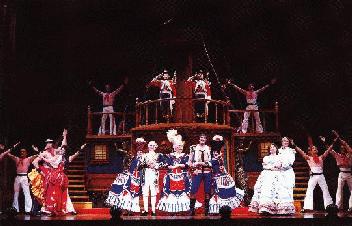 Full Company |
The show begins with the male chorus (sailors) swinging down from the roof on ropes. Their performance is extremely athletic throughout and is one of the highlights of the production (as Dick Deadeye says, "Don't you like Riverdance?"). The part of Dick Deadeye has been enlarged in this production (it incorporates many of the lines of Bill Bobstay and Bob Beckett) to accommodate Jon English (previously Pirate King). English has a wonderful stage presence and a great sense of fun, though his voice has seen better days, and his use of a regional (Cockney?) accent was not a good idea. He does the accent well, but too many of his audience know his normal voice, and to them, its just Jon English putting on a funny accent.
[Editor's Note: English wrote me after this article was posted:
I would like to point out that Deadeye's accent is NOT cockney, it's in fact a pretty accurate west-country accent that I worked very hard on getting right, or should I say 'ROIT'. My old aunt Con is from 'that way' and I spent many a school holiday 'out west'. I bow to Drew Forsyth's prediction that, 'It's clever but no-one will get it,' but stand by my choice. The accent is pure PENZANCE!! Ask my lawn-mower man he's from there and pats me on the back for it. Still, I guess if people don't get it, it's my fault anyway.]
Things don't stay stuffy for long when English is on stage: "A British Tar" is sung first as Sullivan intended — as an unaccompanied part song — which is not jolly enough for Deadeye:
Deadeye. A bit three tenors — expensive, but pointless.
The refrain ("His eyes should flash and his breast protrude,/ And this should be his customary attitude") is then transformed into the main hit of the show, with rousing accompaniment and chorus, and much play on the modern usage of "attitude":
Deadeye. I'll get some "attitude" going!
As in the Essgee Pirates and Mikado, the female chorus is sung by an outrageous trio with appalling wigs — the Absolutely Fabulettes:
His sister and his cousin,
And there never was a dozen,
[At least, I think that's what they sing]
And his aunt!
Helen Donaldson (Josephine) has a wonderful voice that is worthy of grand opera — thank goodness that, like Sullivan, she has been inveigled into participating in downmarket good old G&S. On reflection, she's far too handsome to be a grand opera diva. Simon Gallaher (Ralph Rackstraw), who is also the producer, has a voice on a par with Helen Donaldson's. Simon Gallaher's dual role as lead singer and producer attracts some attention:
Buttercup. Who's the youth whose faltering feet with difficulty bear him on his course?
Deadeye. What?
Buttercup. Who's the clumsy idiot up there on the ropes?
Deadeye. That's the producer.
Buttercup. He's not that clumsy then, is he?
And, after the Captain is found to be a member of the crew:
Josephine. My father — a simple sailor?
Deadeye. No! That's Simple Simon.
Pinafore is one of Gilbert's more credible variations on the theme of girl meets boy in difficult circumstances — at least Josephine gives some consideration to the consequences of her choice of partner. (In Pirates, Mabel declares for Frederic before they have even met.) In this version of Pinafore, the duets between Josephine and Ralph are sung very well indeed, and the two actors give a convincing portrayal of a young couple in love. Josephine's delight at being with Ralph contrasts starkly with her disgust at Drew Forsythe's brilliantly lewd, disgusting, snorting, stammering and snivelling Sir Joseph Porter. Forsythe has (I presume) a cushion (or similar) placed strategically in his crotch, which he wiggles to great effect. Much play is made of Sir Joseph's comment that British sailors are the bulwark of England's greatness:
Deadeye. I'm a bulwark.
Sir Joseph. Seaman Bulwark!
Deadeye. No Sir, Seaman Deadeye, Sir. Dick to you, Sir.
Sir Joseph. And Dick to you too!
Deadeye. No Sir, Seaman Dick Deadeye.
Sir Joseph. I see you're Dick.
Captain. You're obviously a bit distracted by Dick, Sir.
Deadeye. Why don't you call me Richard, Sir?
Puerile — but they carry it off rather well. And Amanda Muggleton makes a particularly saucy Buttercup:
Buttercup. Confide in me. Fear not — I am a mother! [Places Captain's hand on her bare breast.]
Captain: Yes, little Buttercups.
(...and later...)
Captain. Miss Bottoms-up... Miss Buttocks-up… [Exasperated] Miss Buttercup.
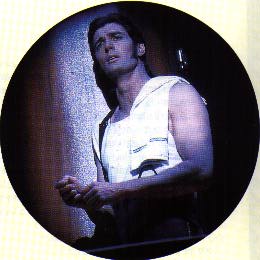 David Gould as Captain Corcoran |
David Gould (Captain Corcoran) has a very deep rich bass voice, and the antics of his chest muscles have to be seen to be believed. However, I prefer the traditional "Weeeeeell, hardly everrr (swear a big, big D)" to David Gould's straight "Well, hardly ever", and his acting is rather wooden by comparison with the rest of the cast, though Gould's rather earnest mein is nicely contrasted to Forsythe's flighty Sir Joseph:
Captain. I have composed a brief welcome speech in [Sir Joseph's] honour. [Of about 20 pages, which he drops several times.]
Captain [reading]. Welcome, Sir Joseph.
Sir Joseph [quickly grabs all 20 pages]. Thank you.
Large quantities of champagne are consumed during "Never Mind the Why and Wherefore," which has two extra verses (performed as encores):
Josephine. And a tar who ploughs the water! [followed later by] Josephine. And a tar who ploughs the daughter! Sir Joseph. She'll cavort when I have taught her. Josephine. I'll outfox your trot Lord Porter. Sir Joseph. Quickly, sailor, tell the tailor
That my gusset's come apart.Josephine [sewing
up his trousersWon't see this in D'Oyly Carte!" [A comment that applies to much of this production.] [After the song, all are tipsy]
Deadeye [hissing]. Pissst! Captain!
Captain. I am not.
Deadeye. Sir, it's me!
Captain. Oh great! The return of the Deadeye.
Deadeye. I don't know, Sir, did you?
And the denouement? Sir Joseph has (almost) the last word:
Am I to understand that, when they were waifs, this waif [the Captain] was that waif [Ralph], and that waif [Ralph] was this waif [the Captain]; and now this waif, Ralph, wants that waif's waif, that waif [Josephine], to be his wife [pronounced, of course, "waif"]?
I have a young colleague who, as a university student, had a holiday job as a backstage hand — and one holiday he worked on the Essgee production of Pirates. He tells me that the whole company had a great time, on and off the stage. These people are not just pretending to have a good time on stage, they are actually enjoying themselves — and it shows. My children (aged 10, 8 and 4, all Jon English and Helen Donaldson fans) demanded to see the live performance twice, and I needed little persuasion. See this production if you can — unless you're a G&S purist (and then you certainly should not see it, because you might enjoy it, which would be terrible).
Editor's Postscript
I am just as enthusiastic as Frank Shann about the Essgee Pinafore, perhaps even more so. Indeed, I think it is easily the best of the Essgee trilogy. Not that the two earlier videos — Pirates and Mikado — were anything to sneeze at. But Pirates was clearly a remake of the Papp production in many respects. And Mikado, at least on video, was marred by excessive hamming and irrelevant horseplay.
Pinafore has the inspired originality that made one marvel at the Papp Pirates way back in the early eighties. And, unlike the other two videos, the cast keep down the irrelevant improvising, making this by far the best-paced of the three videos. It comes in at a svelte two hours.
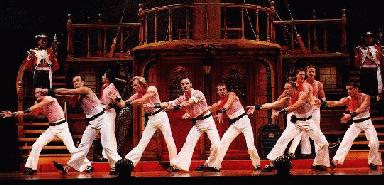 "We sail the ocean blue" |
The set is a creative marvel, by far the best Pinafore set I have ever seen. It is a realistic-looking ship on a platform that revolves. In some places, the ship turns 180 degrees to indicate a change of scene. In others, it turns while the action goes on, much as a movie director would move his camera to show the characters from multiple points of view.
As in the Essgee Mikado, the opera is largely rewritten to give Jon English a bigger role (here, a conflation of Dick Deadeye and the Boatswain), plus several interpolated songs. One might wonder how this could work, considering that in Gilbert's libretto the two characters express opposite sentiments, but the Essgee creative team has cleverly blended them, creating a brand new, yet highly memorable character. As with Papp's Pirates, you have to enjoy it on its own terms, and not worry about the fact that Gilbert has been left behind. Unlike Frank Shann, I thought English's interpratation was a complete success.
The interpolated songs, all with completely new words, are:
- King Gama's "I can't think why," in which Deadeye introduces himself early in Act I.
- The Roulette song from The Grand Duke, early in Act II, with Deadeye running the gaming tables.
- "If you go in," from Iolanthe, in which the Captain and Deadeye urge Sir Joseph to "make one more effort."
That's not all: there's an extra duet for Ralph and Josephine in Act II which juxtaposes "In sailing o'er life's ocean wide" from Ruddigore and "The world is but a broken toy" from Princess Ida. "Fair moon," here a duet between the Captain and Buttercup, pulls in bits of "O foolish fay."
When you update Gilbert so radically, there's a danger of ruining it, but this production gets it right. It's not just a collection of cute bits: there's great acting here. I thought the dialogue before "Never mind the why and wherefore" was the best I'd ever seen in any production. There are ideas here that even traditional Pinafores could borrow.
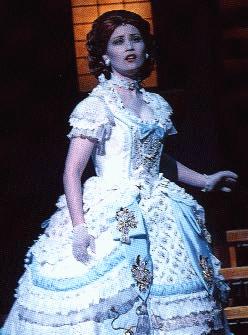 Helen Donaldson as Josephine |
The cast are generally excellent. Simon Gallaher and Helen Donaldson are a superb couple. Unlike the Pirates, Donaldson gets to join in the fun and shows what a fine comedienne she is. Drew Forsythe is an odious Sir Joseph — no question here why Josephine loathes him — but perhaps his antics are a tad overdone. Amanda Muggleton's Buttercup has great legs and a sensual stage presence. She is no traditional bumboat woman. However, her singing voice is rather thin.
As in the other two Essgee productions, the women's chorus is pared down to just three ladies, now re-dubbed "The Absolutely Fabulettes." They are better integrated into the action here than in the earlier shows. There is no Hebe character. At the end of the opera, instead of marrying Hebe, Sir Joseph promotes Dick Deadeye to admiral and appoints him co-ruler of the Queen's Navee.
I didn't have the same objection Frank Shann had to David Gould's Captain. His stiff upper lip is a perfect foil to the rest of the cast, and the joke made of his twenty-page "welcome speech" for Sir Joseph (see Frank's review above) is one of the production's highlights. Both of his solo numbers are transposed down to basso profundo range.
A couple of times, the production lapses from good taste. The Captain sings "Fair moon" in his undershirt, apparently for no other reason than to allow David Gould to strip it off in "Things are seldom what they seem" and show off his pectorals.
After the Captain says "damme," Sir Joseph retorts:
Go, ribald, get you hence,
To your cabin with celerity.
This is the end
Of our G&S trilogy.
Which it is, but these lines yank us out of context in what should be the opera's dramatic climax.
Like the other two operas in the Essgee trilogy, the show ends with a "mega-mix," in which all the characters re-enter and sing souped-up versions of their signature numbers. However, after this comes the "multi-mix," in which numbers from all three Essgee shows are reprised, and the principals re-enter in costumes they played in the earlier productions. The web site makes comparisons to George Lucas's Star Wars trilogy, and Steven Spielberg's three "Indiana Jones" movies. Apparently, Gallaher is done with producing G&S — at least for a while.
Roy Mills was a lot less enthusiastic about this production than I was. He wrote:
I have just watched this video, I doubt if I shall watch it again. Extremely disappointing IMHO.
Almost a parody, very poor orchestra, Dick Deadeye a totally new character with a couple of new songs which are poor in themselves and particularly in comparison with original material. Extract from Iolanthe fitted in well, but why was it necessary, unless to atone for the other pointless and tasteless modifications? Only 3 ladies in the chorus, one sister, one cousin, one aunt. Buttercup a floosie. Corcoran, Josephine and Ralph the only good parts.
My rating: half a star. Not worth the postage even if the tape was free.
The production has been released commercially only on both PAL and NTSC video. There was separate New Zealand release (PAL only) of a different performance. Mel Moratti writes: "My copy of the video was recorded at St. James Theatre, Auckland in May '97 and has the same cast except our local Rima te Wiata playing Buttercup. The Absolutely Fabulettes are listed as The Fabulous Singlettes in the NZ video."
The Essgee products are available from http://ezwidget.com/essgee. For information, write to info@essgee.com.
| Date | Label | Format | Number | Comments |
|---|---|---|---|---|
| 1997 | Essgee Entertainment | VHS PAL, NTSC | [no number] | Australia Release |
| 1997 | Essgee Entertainment | VHS PAL | 700281 | New Zealand Release |
| 2001 | Essgee Entertainment | VHS PAL, NTSC | [no number] | Box set including the Essgee Pirates, Mikado and Pinafore. This set includes the New Zealand performance of Pirates. |
